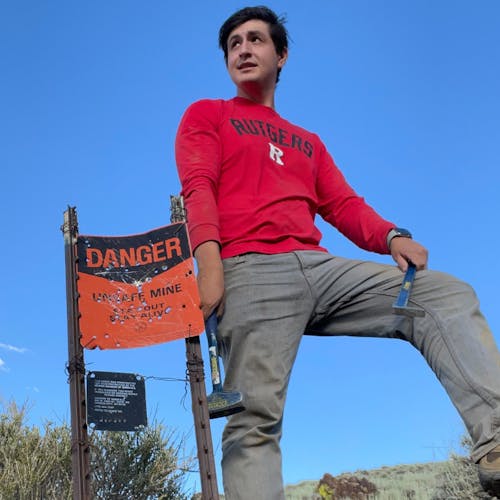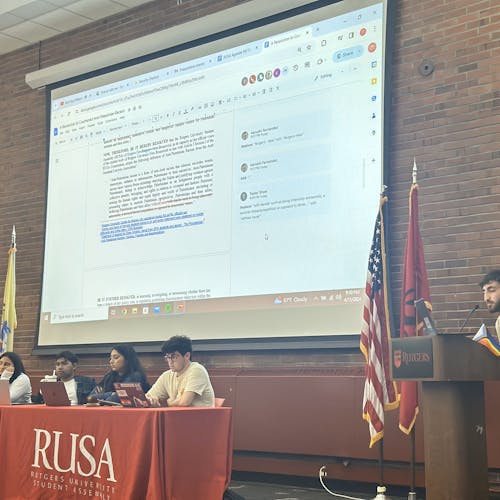Local groups converge at Rutgers for discussion on sustainability, ways to alleviate pressures of climate change

In light of rising environmental concerns, a “Clean Energy for a Better Future” event was held at the Cook Student Center Wednesday evening. Hosted by Food & Water Watch and The Andrew Goodman Foundation, the event was constructed as an educational forum with participant interaction.
Numerous other organizations, largely local, also attended the meeting. Representatives from establishments, such as the Raíces Cultural Center in New Brunswick and the Franklin Township Task Force, embodied local sustainable advocacy, whereas members of NJPIRG and the Central Jersey Coalition Against Endless War emphasized less visible factors that contribute to the climate change crisis.
This encompassing approach to environmental issues was most prominent in the choice of speakers for the event. Four individuals presented their viewpoints on the realities of climate change and why it is imperative to acknowledge them.
“It’s great to have different perspectives. (Climate change) is a multidisciplinary problem that requires people who can address it from different angles,” said Dr. Robert Laumbach, associate professor in the School of Public Health and the Environmental and Occupational Health Sciences Institute.
Laumbach was 1 of the 4 speakers discussing the effects air pollutants and climate phenomena have on physiological and mental health. While he offered insight on human health, other speakers remarked on climate change’s lineage back to capitalism, government exploitation and demographic-based inequalities.
Scott Edwards, the National Climate and Energy Program director for Food & Water Watch, spoke on the organization’s goals for New Jersey’s future as well as how policies have the ability to counteract them.
The Food & Water Watch’s primary initiative is “Off Fossil Fuels,” a plan to convert the state to 100 percent renewable energy by the year 2035.
According to Food & Water Watch’s fact sheet, the New Jersey Off Fossil Fuels Act (S1405/A1823) is the “strongest climate bill in history.” Edwards and Matthew Smith, senior organizer for Food & Water Watch, emphasized the importance of proactivity, as the planet approaches a point of irreversible damage.
Several policies in the past have been implemented to reduce or mitigate the rate of climate change, but deceptively so, Edwards said. Emissions cap and trades, most popular in California, were designed to reduce emissions by imposing a tax on facilities that exceed a set limit, but facilities have instead paid the fees and continued polluting, leaving no significant decrease in carbon emissions.
Taking a more international stance, Jessamyn Bonafe, a School of Arts and Sciences senior, discussed the detrimental influence imperialism and exploitation have on environmental justice in the Philippines.
Militarization and environmental devastation in the forms of logging, quarrying and mining, give reason to believe that Typhoon Sendong, thought to be the world’s deadliest storm of 2011, was man-made.
Anakbayan, a national organization of Filipino students, is spreading awareness and protesting the further government-endorsed destruction of the Philippines.
Closer to home, organizations, such as Food & Water Watch, are also making efforts to engage communities around New Jersey to participate in the climate change dialogue.
“FWW’s short term goals for clean energy and sustainability include engaging thousands of students and community members throughout New Jersey in a conversation about the effects of fossil fuels on our environment and future (as well as) educating people about current energy policies and showing how they can get involved in the democratic process to create positive and sustainable change,” said Aubrey Abbes, a Food & Water Watch intern and an Edward J. Bloustein School of Planning and Public Policy senior in an email.
The event closed with an open question session for the speaker panel. Questions tackled the role of the marketplace in the climate change movement as well as the possibility of using other sources of energy, such as nuclear power.
Smith concluded with a call to action — stressing the importance of participating in the climate change discussion and re-emphasizing the necessity for everyone, especially government officials, to collaborate to make New Jersey 100-percent-renewable-energy based by 2035.
“Today people of all ages, but especially younger individuals, are concerned with the future of their environment. Getting involved ... provides the knowledge, tools and resources needed to effect positive change for the environment and for a sustainable future,” said Kristin Terez, a Food & Water Watch intern and School of Environmental and Biological Sciences junior in an email.



